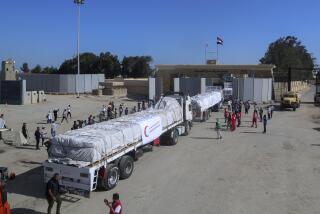A Mutual Liberation Movement : Newly signed agreement unfetters Israelis as well as Palestinians
The theatrics that delayed and for a time seemed about to abort Wednesday’s signing by Israel and the Palestine Liberation Organization of their historic accord can be taken as a paradigm for the tortuous peacemaking process that, with one major breakthrough achieved, now goes forward.
PLO Chairman Yasser Arafat, apparently badly briefed about the nature of some maps he was supposed to sign, created a scene by appearing ready to walk out on the heavily attended ceremony. Explanations were quickly made, clarifications provided and eventually the signing took place. The way is now open at last for limited Palestinian self-rule in the Gaza Strip and the West Bank town of Jericho, and for at least the partial lifting of the 27-year-long Israeli occupation. It will mark the beginning, as former Israeli Foreign Minister Abba Eban eloquently suggested in these pages Wednesday, of a liberation for Israel no less than for the Palestinians.
Typically, there could be a hitch. Prime Minister Yitzhak Rabin says that Arafat wants a delay of two or three weeks in the transfer of authority because--after decades of waiting and months of anticipation!--the Palestinians aren’t quite ready to take over. If that’s the case blame Arfafat’s notoriously inefficient managerial habits. Never willing to delegate authority, he has been woefully slow to name many of the administrators who are to take over such routine but vital civic functions as education, health and public welfare. Expectations among Palestinians for dramatic changes in their lives are understandably high. More delay in the hand-over to Palestinian officials may not be accepted calmly.
A key purpose of the limited self-rule plan is to show that Palestinians and Israelis can live side by side, if not yet in amity then at least cooperatively and civilly. How this test is met will have a big influence on the next phase of negotiations, which aims at reaching a final political settlement. Opponents of compromise on both sides can be expected to do their utmost to sabotage its prospects. More than ever, decisive and courageous leadership--and maybe more than a little help from Washington--will be needed to see this process through to a successful conclusion.
More to Read
Sign up for Essential California
The most important California stories and recommendations in your inbox every morning.
You may occasionally receive promotional content from the Los Angeles Times.










